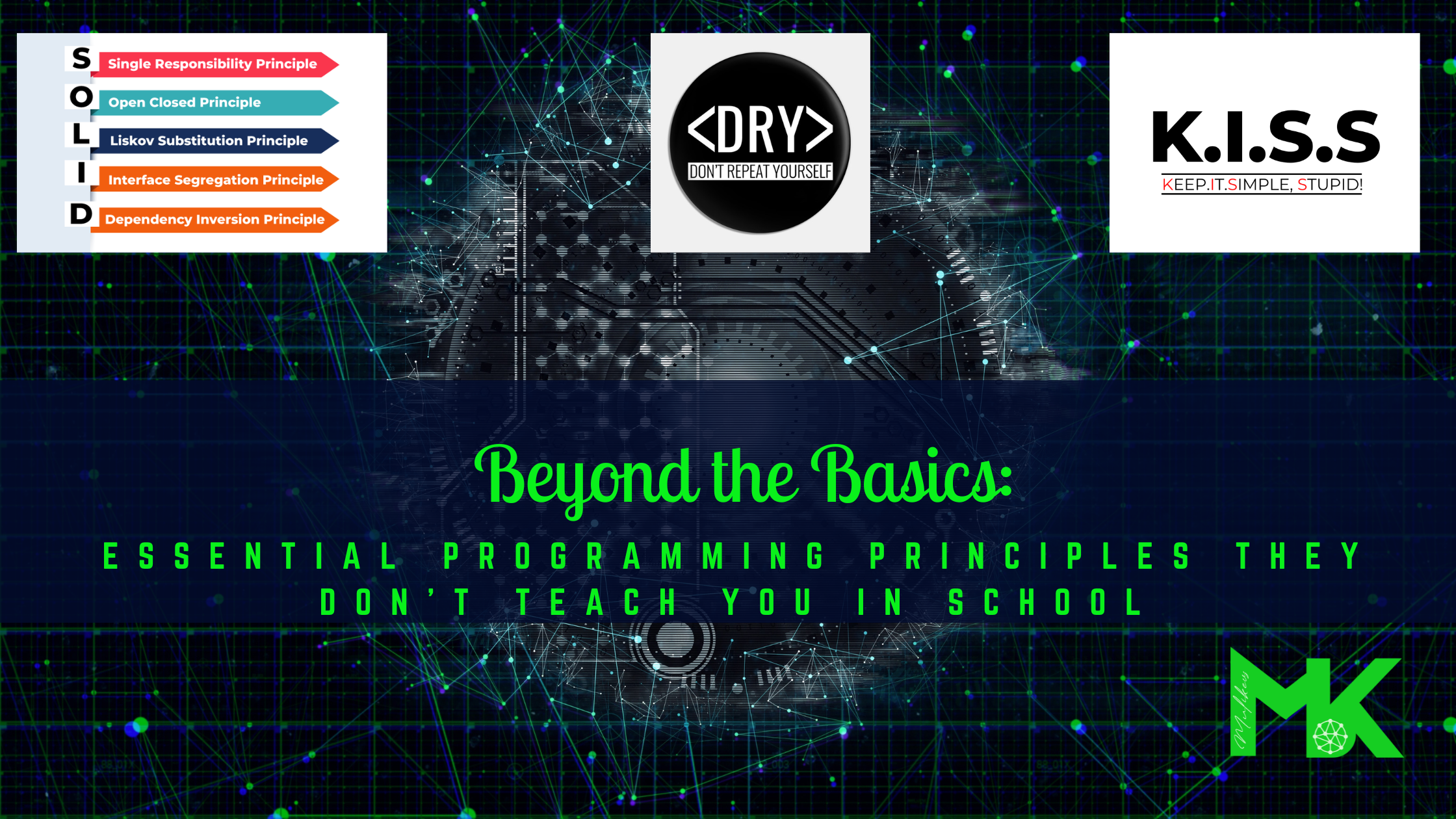Beyond the Basics: Essential Programming Principles They Don't Teach You in School
Programming Principles
Beyond the Basics: Essential Programming Principles They Don't Teach You in School
Learning to code opens doors to a world of creativity and problem-solving. But classrooms often focus on syntax and core concepts, leaving some crucial principles for the real world to teach. This blog post dives into three essential principles that will elevate your coding skills and make you a more effective developer: DRY, KISS, and the SOLID principles.
1. DRY: Don't Repeat Yourself
Imagine writing the same block of code ten times over. Redundancy is the enemy of clean and maintainable code. The DRY (Don't Repeat Yourself) principle encourages writing reusable code. Here's how:
- Functions: Break down repetitive logic into functions. This promotes modularity and makes your code easier to understand and modify.
- Libraries: Utilize existing libraries for common tasks. Reinventing the wheel wastes time and effort.
- Abstraction: Identify common patterns and create abstractions (like classes or interfaces) to encapsulate them.
By embracing DRY, you create cleaner, more efficient code that's easier to maintain and update.
2. KISS: Keep It Simple Stupid
Elegance is often found in simplicity. The KISS (Keep It Simple Stupid) principle emphasizes writing clear, concise, and easy-to-understand code. Here are some ways to achieve this:
- Meaningful variable names: Use descriptive names that reflect the purpose of the variable.
- Comments: Add comments to explain complex logic, but avoid over-commenting clear code.
- Logical flow: Structure your code with a clear flow and avoid unnecessary complexity.
Remember, complex code might impress initially, but it becomes a nightmare to maintain and debug later. KISS ensures your code remains understandable not just to you but to anyone reading it.
3. The SOLID Principles
The SOLID principles are a collection of five design principles that promote object-oriented programming best practices. Let's explore each one:
- Single Responsibility Principle: A class should have one reason to change. This keeps classes focused and reduces complexity.
- Open/Closed Principle: Classes should be open for extension, but closed for modification. Use inheritance and composition to add functionality without modifying existing code.
- Liskov Substitution Principle: Subtypes should be substitutable for their base types without breaking the program. This ensures code written for the base type works seamlessly with its subtypes.
- Interface Segregation Principle: Clients shouldn't be forced to depend on methods they don't use. Create smaller, specific interfaces instead of large, generic ones.
- Dependency Inversion Principle: High-level modules shouldn't depend on low-level modules. Both should depend on abstractions. This promotes loose coupling and makes your code more flexible and testable.
By following the SOLID principles, you create robust, maintainable, and scalable object-oriented code.
Conclusion
DRY, KISS, and SOLID are just a few of the principles that can elevate your coding skills beyond what you learn in school. Mastering these principles will make you a more efficient and effective developer. Remember, clean, well-structured code not only works well but also becomes a joy to work with. So, embrace these principles and write code that speaks for itself!
Beyond the Basics: Essential Programming Principles They Don't Teach You in School
 "Complexity is the enemy of maintainability. Embrace simplicity, and your code will stand the test of time." - Unknown
"Complexity is the enemy of maintainability. Embrace simplicity, and your code will stand the test of time." - Unknown
April 02, 2024

